MongoDB
This page describes the default configuration settings, how to edit the configuration to collect additional information, the metrics available for integration, and a sample result in the Sysdig Monitor UI.
MongoDB Setup
Create a read-only user for the Sysdig agent.
# Authenticate as the admin user.
use admin
db.auth("admin", "<YOUR_MONGODB_ADMIN_PASSWORD>")
# On MongoDB 2.x, use the addUser command.
db.addUser("sysdig-cloud", "sysdig-cloud-password", true)
# On MongoDB 3.x or higher, use the createUser command.
db.createUser({
"user":"sysdig-cloud",
"pwd": "sysdig-cloud-password",
"roles" : [
{role: 'read', db: 'admin' },
{role: 'clusterMonitor', db: 'admin'},
{role: 'read', db: 'local' }
]
})
Sysdig Agent Configuration
Review how to Edit dragent.yaml to Integrate or Modify Application Checks.
Default Configuration
By default, Sysdig’s dragent.default.yaml uses the following code to
connect with MongoDB.
app_checks:
- name: mongodb
check_module: mongo
pattern:
comm: mongod
conf:
server: "mongodb://localhost:{port}/admin"
The default MongoDB entry should work for without modification if authentication is not configured. If you have enabled password authentication, the entry will need to be changed.
Some metrics are not available by default. Additional configuration needs to be provided to collect them as shown in following examples.
Remember! Never edit dragent.default.yaml directly; always edit
only dragent.yaml.
Example 1: With Authentication
Replace <username> and <password> with actual username and password.
app_checks:
- name: mongodb
check_module: mongo
pattern:
comm: mongod
conf:
server: mongodb://<username>:<password>@localhost:{port}/admin
replica_check: true
Example 2: Additional Metrics
Some metrics are not collected by default. These can be collected by
adding additional_metrics section in the dragent.yaml file under the
app_checks mongodb configuration.
Available options are:
collection - Metrics of the specified collections
metrics.commands - Use of database commands
tcmalloc - TCMalloc memory allocator
top - Usage statistics for each collection
app_checks:
- name: mongodb
check_module: mongo
pattern:
comm: mongod
conf:
server: mongodb://<username>:<password>@localhost:{port}/admin
replica_check: true
additional_metrics:
- collection
- metrics.commands
- tcmalloc
- top
List of metrics with respective entries in dragent.yaml:
| metric prefix | Entry under additional_metrics |
|---|---|
| mongodb.collection | collection |
| mongodb.usage.commands | top |
| mongodb.usage.getmore | top |
| mongodb.usage.insert | top |
| mongodb.usage.queries | top |
| mongodb.usage.readLock | top |
| mongodb.usage.writeLock | top |
| mongodb.usage.remove | top |
| mongodb.usage.total | top |
| mongodb.usage.update | top |
| mongodb.usage.writeLock | top |
| mongodb.tcmalloc | tcmalloc |
| mongodb.metrics.commands | metrics.commands |
Example 3: Collections Metrics
MongoDB stores documents in collections. Collections are analogous to tables in relational databases. The Sysdig agent by default does not collect the following collections metrics:
collections: List of MongoDB collections to be polled by the agent. Metrics will be collected for the specified set of collections. This configuration requires theadditional_metrics.collectionsection to be present with an entry forcollectionin thedragent.yamlfile. Thecollectionentry underadditional_metricsis a flag that enables the collection metrics.collections_indexes_stats: Collect indexes access metrics for every index in every collection in thecollectionslist. The default value is false.The metric is available starting MongoDB v3.2.
For the agent to poll them, you must configure the dragent.yaml file
and add an entry corresponding to the metrics to the conf section as
follows.
app_checks:
- name: mongodb
check_module: mongo
pattern:
comm: mongod
conf:
server: mongodb://<username>:<password>@localhost:{port}/admin
replica_check: true
additional_metrics:
- collection
- metrics.commands
- tcmalloc
- top
collections:
- <LIST_COLLECTIONS>
collections_indexes_stats: true
Configure SSL for MongoDB App Check
You can tighten the security measure of the app check connection with
MongoDB by establishing an SSL connection. To enable secure
communication, you need to set the SSL configuration in dragent.yaml
to true. In an advanced deployment with multi-instances of MongoDB, you
need to include a custom CA certificate or client certificate and other
additional configurations.
Basic SSL Connection
In a basic SSL connection:
A single MongoDB instance is running on the host.
An SSL connection with no advanced features, such as the use of a custom CA certificate or client certificate.
To establish a basic SSL connection between the agent and the MongoDB instance:
Open the
dragent.yamlfile.Configure the SSL entries as follows:
app_checks: - name: mongodb check_module: mongo pattern: comm: mongod conf: server: "mongodb://<HOSTNAME>:{port}/admin" ssl: true # ssl_cert_reqs: 0 # Disable SSL validationTo disable SSL validation, set
ssl_cert_reqsto0. This setting is equivalent tossl_cert_reqs=CERT_NONE.
Advanced SSL Connection
In an advanced SSL connection:
Advanced features, such as custom CA certificate or client certificate, are configured.
Single or multi-MongoDB instances are running on the host. The agent is installed as one of the following:
Container
Service
Prerequisites
Set up the following:
Custom CA certificate
Client SSL verification
SSL validation
(Optional ) SSL Configuration Parameters
Parameters | Description |
|---|---|
| The certificate file that is used to identify the local connection with MongoDB. |
| The private keyfile that is used to identify the local connection with MongoDB. Ignore this option if the key is included with |
| Specifies whether a certificate is required from the MongoDB server, and whether it will be validated if provided. Possible values are:
|
| The |
Sysdig Agent as a Container
If Sysdig agent is installed as a container, start it with an extra volume containing the SSL files mentioned in the agent configuration. For example:
# extra parameter added: -v /etc/ssl:/etc/ssl docker run -d --name sysdig-agent --restart always --privileged --net host --pid host -e ACCESS_KEY=xxxxxxxxxxxxx -e SECURE=true -e TAGS=example_tag:example_value -v /var/run/docker.sock:/host/var/run/docker.sock -v /dev:/host/dev -v /proc:/host/proc:ro -v /boot:/host/boot:ro -v /lib/modules:/host/lib/modules:ro -v /usr:/host/usr:ro -v /etc/ssl:/etc/ssl --shm-size=512m sysdig/agentOpen the
dragent.yamlfile and configure the SSL entries:app_checks: - name: mongodb check_module: mongo pattern: comm: mongod conf: server: "mongodb://<HOSTNAME>:{port}/admin" ssl: true # ssl_ca_certs: </path/to/ca/certificate> # ssl_cert_reqs: 0 # Disable SSL validation # ssl_certfile: </path/to/client/certfile> # ssl_keyfile: </path/to/client/keyfile>
Sysdig Agent as a Process
If Sysdig agent is installed as a process, store the SSL files on the host and provide the path in the agent configuration.
app_checks: - name: mongodb check_module: mongo pattern: comm: mongod conf: server: "mongodb://<HOSTNAME>:{port}/admin" ssl: true # ssl_ca_certs: </path/to/ca/certificate> # ssl_cert_reqs: 0 # Disable SSL validation # ssl_certfile: </path/to/client/certfile> # ssl_keyfile: </path/to/client/keyfile>See [optional SSL configuration parameters](/en/integrate-applications-default-app-checks/ for information on SSL certificate files.
Multi-MongoDB Setup
In a multi-MongoDB setup, multiple MongoDB instances are running on a single host. You can configure either a basic or an advanced SSL connection individually for each MongoDB instance.
Store SSL Files
In an advanced connection, different SSL certificates are used for each instance of MongoDB on the same host and are stored in separate directories. For instance, the SSL files corresponding to two different MongoDB instances can be stored at a mount point as follows:
Mount point is
/etc/ssl/Files for instance 1 are stored in
/etc/ssl/mongo1/Files for instance 2 are stored in
/etc/ssl/mongo2/
Configure the Agent
Open the
dragent.yamlfile.Configure the SSL entries as follows:
app_checks: - name: mongodb-ssl-1 check_module: mongo pattern: comm: mongod args: ssl_certificate-1.pem conf: server: "mongodb://<HOSTNAME|Certificate_CN>:{port}/admin" ssl: true ssl_ca_certs: /etc/ssl/mongo1/ca-cert-1 tags: - "instance:ssl-1" - name: mongodb-ssl-2 check_module: mongo pattern: comm: mongod args: ssl_certificate-2.pem conf: server: "mongodb://<HOSTNAME|Certificate_CN>:{port}/admin" ssl: true ssl_ca_certs: /etc/ssl/mongo2/ca-cert-2 tags: - "instance:ssl-2"Replace the names of the instances and certificate files with the names that you prefer.
Metrics Available
See MongoDB Metrics.
Result in the Monitor UI
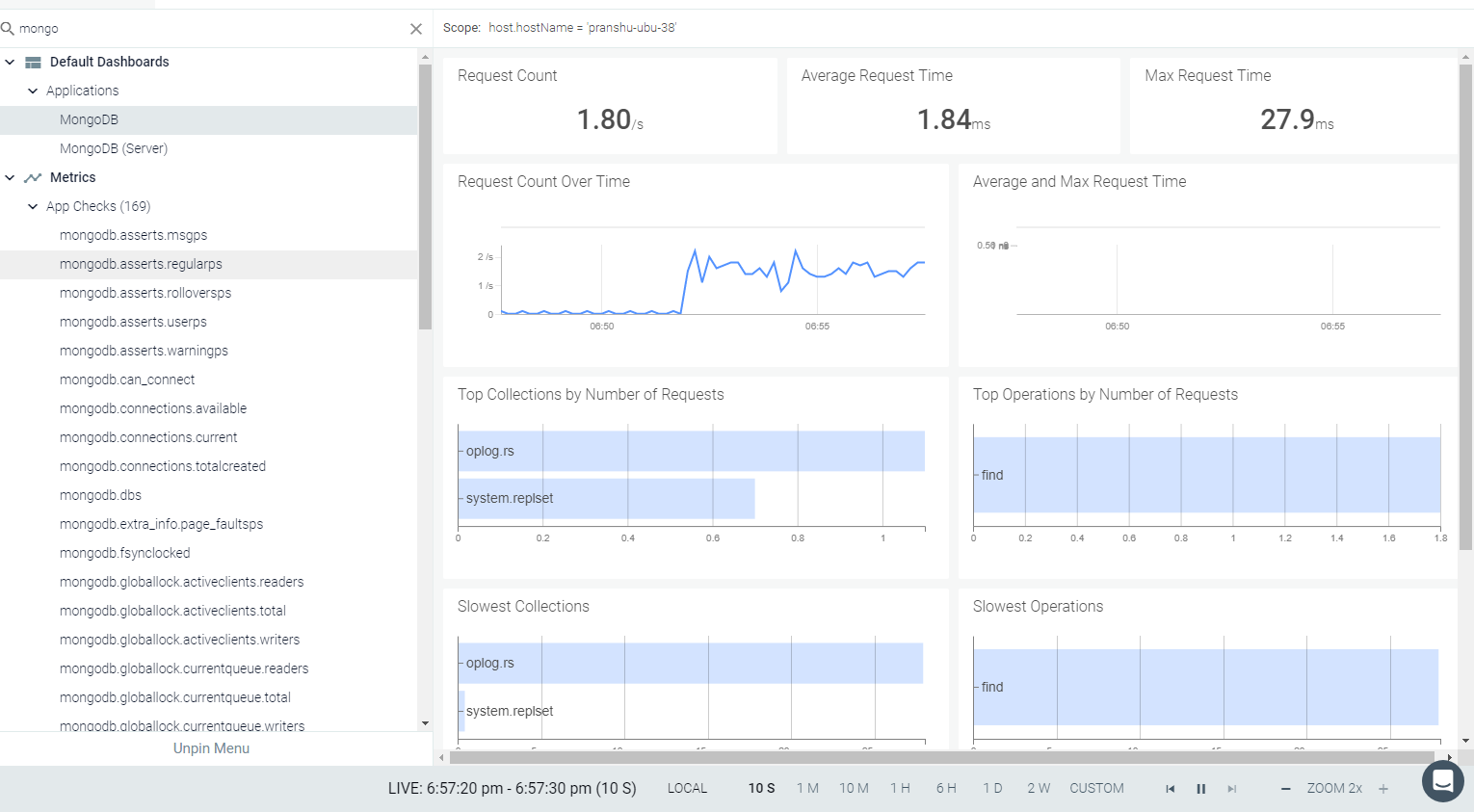
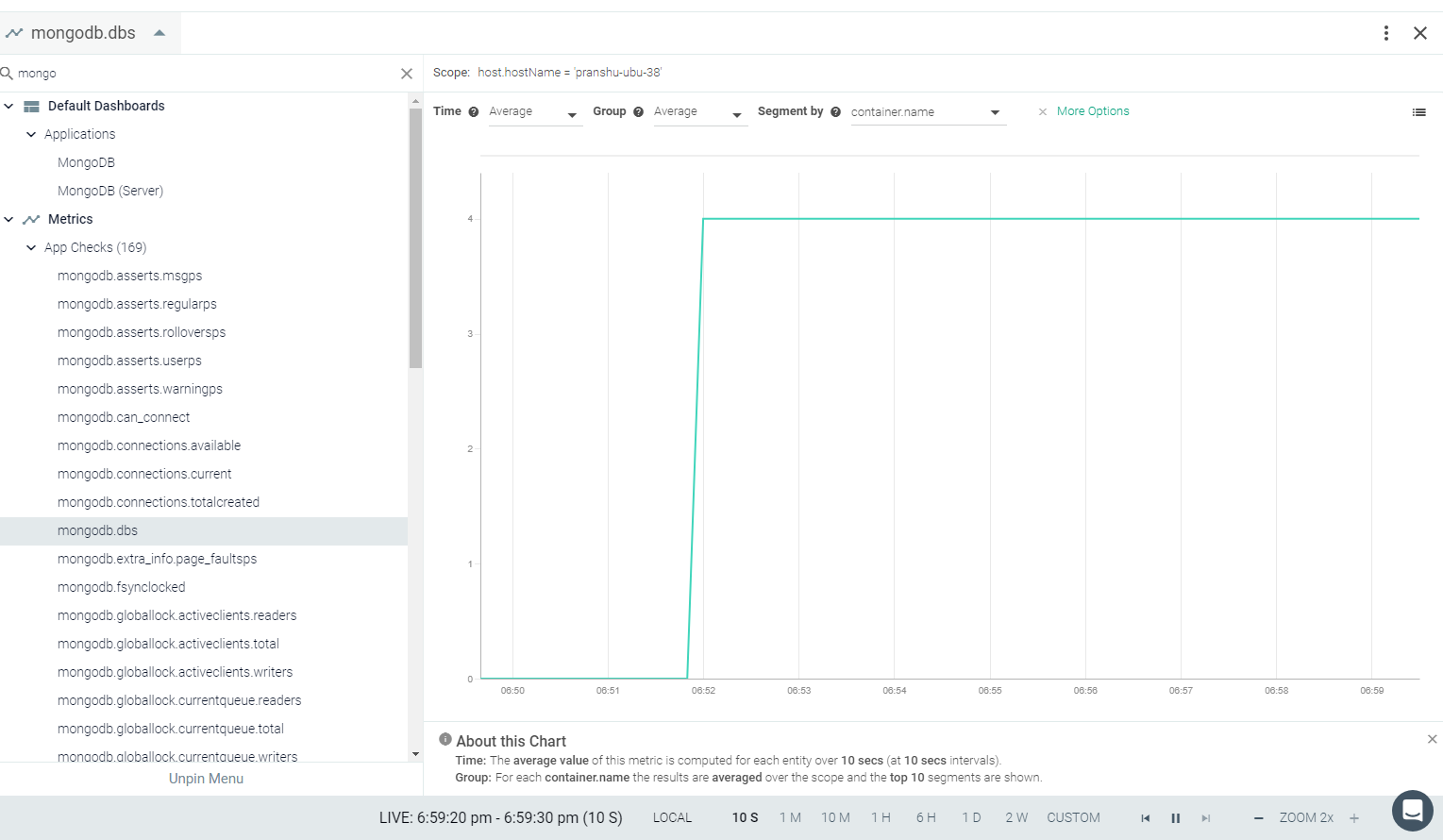
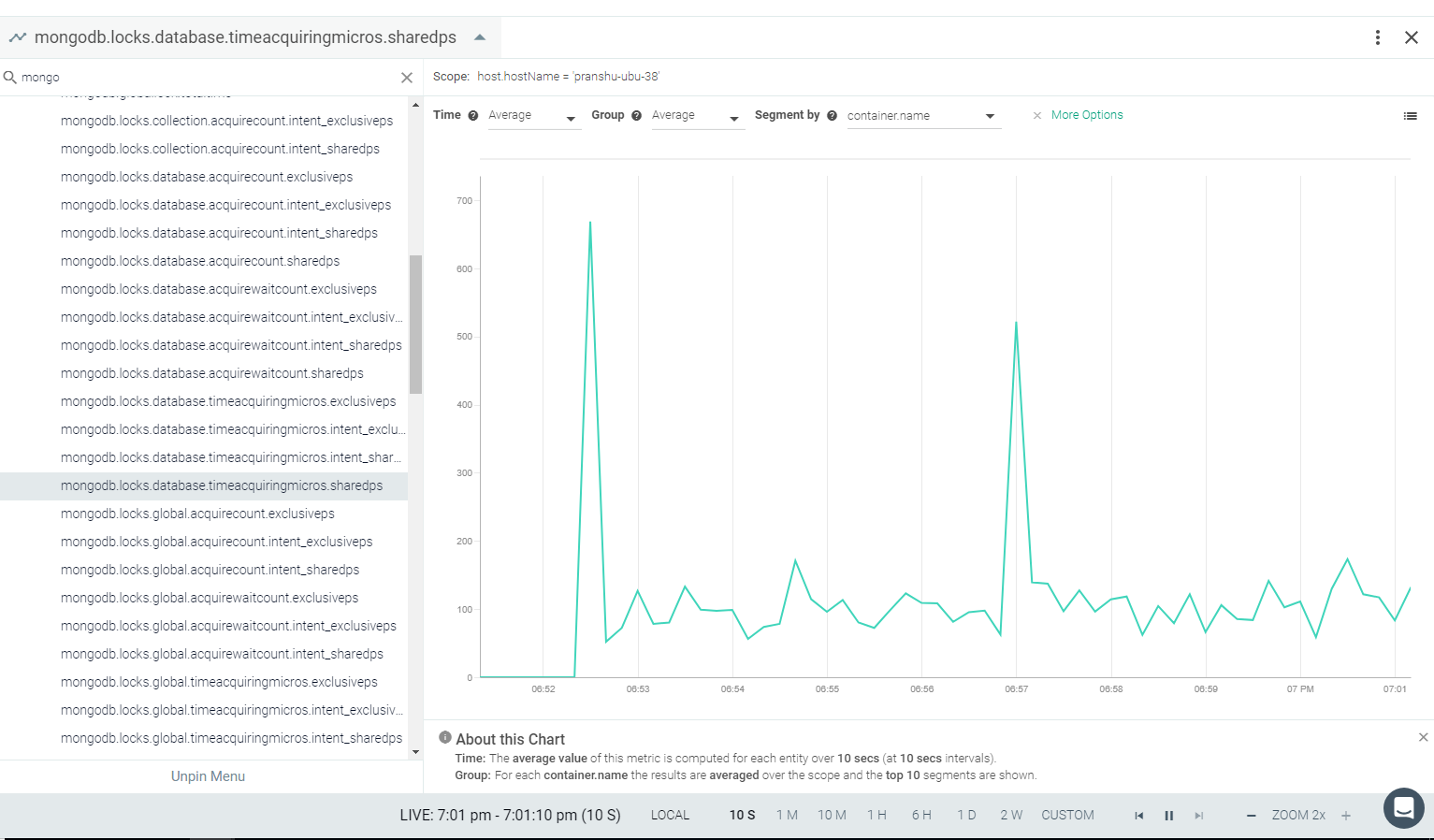
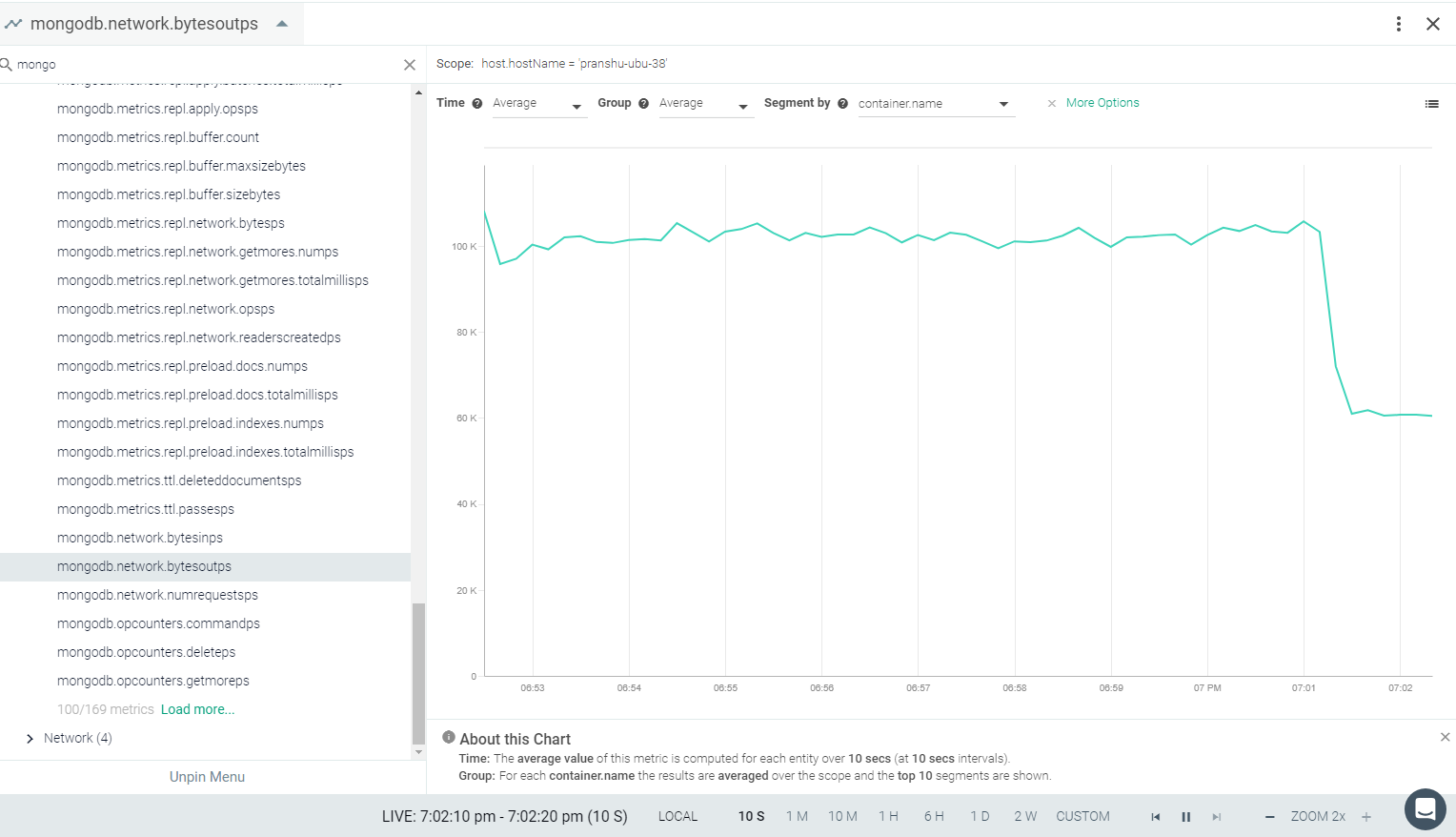
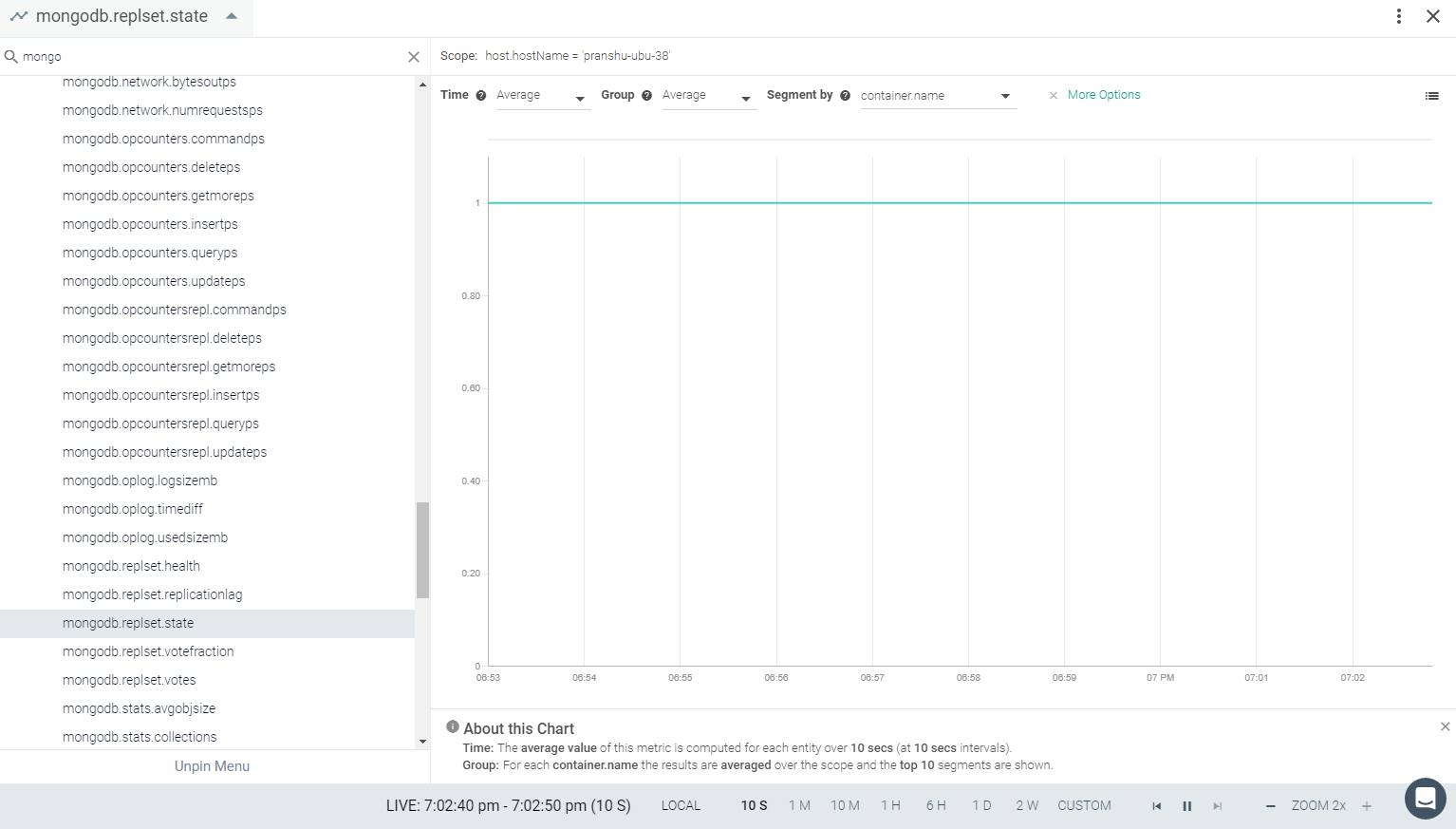
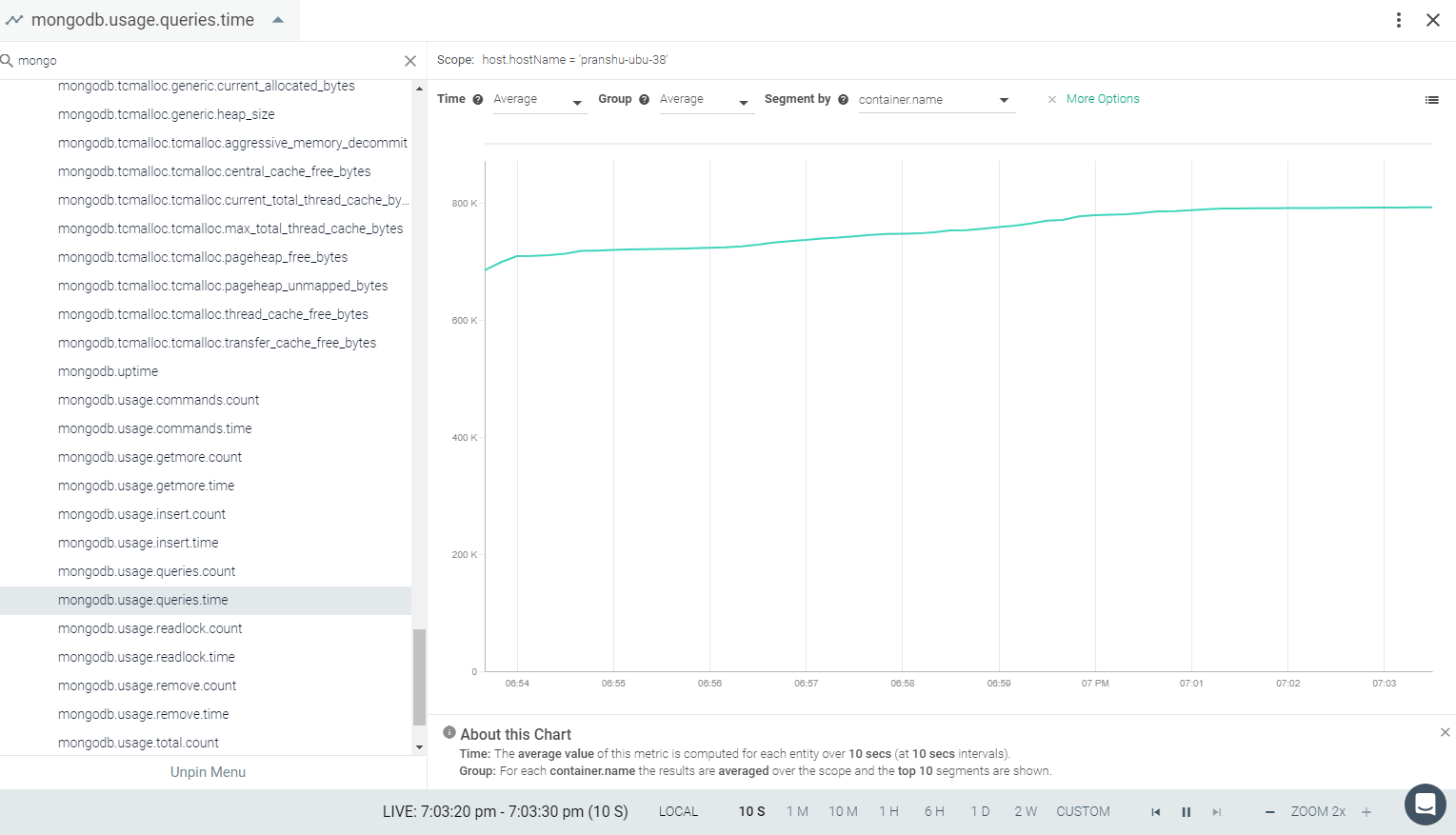
Feedback
Was this page helpful?
Glad to hear it! Please tell us how we can improve.
Sorry to hear that. Please tell us how we can improve.